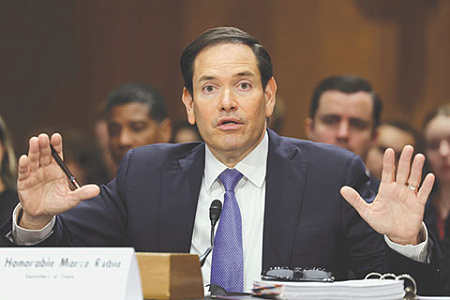
The administration of Donald Trump wants to impose entry restrictions on citizens of 36 countries (including one from the former USSR). Earlier, she blacklisted 12 countries, mostly African ones. People from there are involved in terrorist, anti-Semitic or anti-American activities, according to the State Department. Trump is demonstrating that no one’s opposition or discontent will force him to abandon his main election promise – to block the flow of foreigners illegally staying in the United States.
According to the New York Migration Research Center, in 2023, there were more than 12 million people in the country who did not have any valid documents on its territory.
These are those who came to the United States illegally, mostly through the border with Mexico. Realizing the potential danger of such a situation, the current US president stated during his election campaign that he would seek to tighten migration legislation.
The most radical step in this direction to date has been the introduction on June 4 of a total ban on entry to citizens of 12 countries – Afghanistan, Chad, Eritrea, Myanmar, the Republic of the Congo, Equatorial Guinea, Iran, Libya, Sudan, Yemen, Somalia and Haiti (see NG dated 06/05/25). For seven more countries (Burundi, Sierra Leone, Togo, Laos, Cuba, Venezuela and Turkmenistan) visa requirements have been greatly tightened. In this way, Trump fulfilled his campaign promise to return the so-called Trump travel ban, which was in effect in nine countries during his last presidential term.
This decision was one of the reasons for the protests that swept across the country, both peaceful and not so peaceful. The unrest in California, which the authorities used even the Marines to quell, of course, broke out primarily because of the actions of migration officials. The US Immigration and Customs Enforcement (ICE) is conducting raids on illegal immigrants, although it has suspended these activities in relation to farms, hotels, restaurants and meat processing plants, thereby recognizing that there is no way to do without foreign labor. However, direct entry bans also played a role in destabilizing the situation. The US president’s political decisions have been criticized both by Americans with relatives in visa-restricted countries and by Democrats, who probably saw an opportunity to seize the initiative on migration policy.
At the same time, neither the protests nor the objections of members of the Democratic Party stop Trump, whose administration, as it turned out, is discussing new radical immigration restrictions. Now the prohibitive measures may affect 25 African and 4 Asian countries, as well as the island states of Oceania and the Caribbean – 36 in total. Curiously, the list includes Syria, with which, it would seem, after the fall of Bashar al-Assad’s regime, Americans are restoring relations, and post-Soviet Kyrgyzstan, which the White House has cited as an example for many years. success in building democracy in Central Asia. If the measures discussed in the Trump administration take effect, the United States will shut down virtually all of Africa. And this is despite the fact that during the reign of Joseph Biden, the American government, on the contrary, relied on strengthening ties with the countries of the continent. Even Biden’s last foreign visit as president was to Angola.
The Washington Post, referring to an internal memo signed by US Secretary of State Marco Rubio, cites several reasons why restrictions are planned to be imposed on 36 countries. In some States, the memo claims, there are no authorities that “can issue reliable identity documents or other civil documents,” while others suffer from “widespread corruption.” Restrictions may also be based on the presence of a large number of citizens who were in the United States with expired American visas, and reports of their involvement in “anti-Semitic or anti-American activities” or the organization of terrorist attacks. The countries are scheduled to be given 60 days to correct the violations. Then they may be excluded from the blacklist.
Trump’s team is preparing for lawsuits in the United States and opposition from Democratic congressional factions. But judging by the actions and statements of the White House representatives, she fears an international reaction much less. The American scholar Pavel Sharikov, in an interview with NG, noted that it is unlikely that the United States will face serious consequences in the form of a significant deterioration in relations with those countries against whose citizens restrictions may be imposed. After all, there is a possibility that, in the end, the bans will not be as strict as stated.
“As we remember, in his first term, Trump already tried to introduce the so-called Muslim ban, that is, a complete ban on the entry of citizens of Muslim countries, and this had little effect. In the end, the restrictions were aimed not at the countries themselves, but at certain categories of citizens. For example, the poor and marginalized segments of the population. In any case, Trump’s primary concern is not about relations with other countries, but about what is happening in the United States. Therefore, from the point of view of the general direction of his policy and election promises, this initiative is justified, at least in the eyes of his voters,” the expert said.
